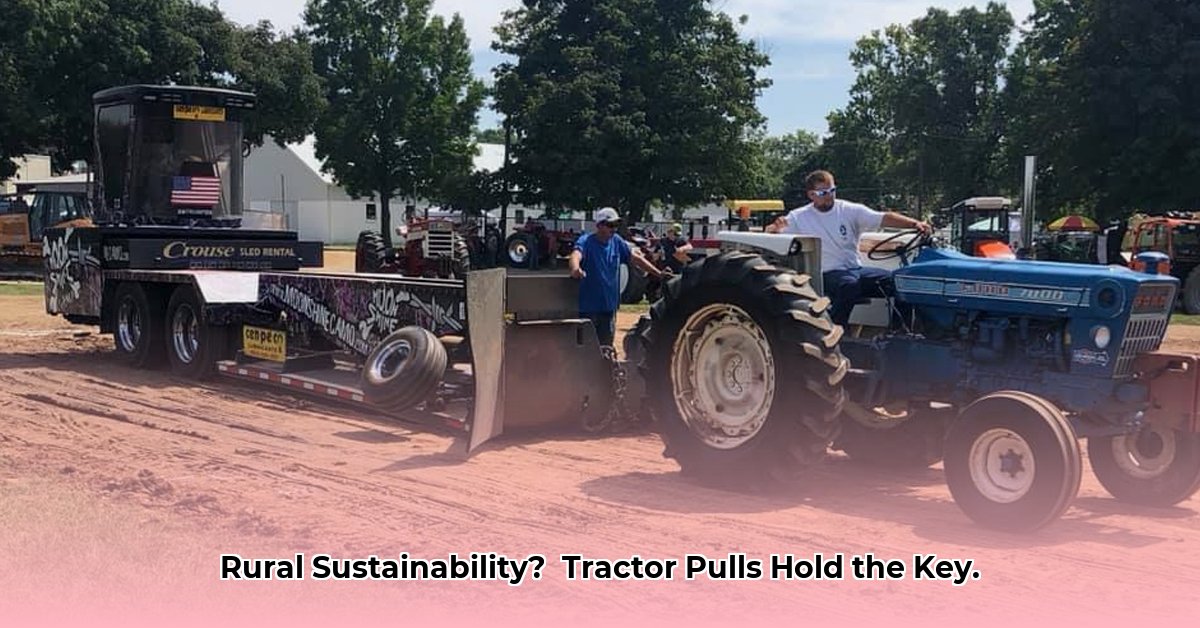
The Brown County Fair tractor pull, a yearly spectacle of horsepower and community spirit, offers a unique lens through which to examine the intersection of rural life, agricultural practices, and environmental sustainability. While the event's primary focus is on competition and entertainment, its inherent connection to agriculture presents a valuable opportunity to promote sustainable practices and strengthen the local economy. For more local events like this, check out local tractor pulls. This article analyzes the event's potential environmental impact and proposes actionable steps to enhance its sustainability, fostering a more responsible and engaging experience for all.
Beyond the Roar: Environmental Considerations and Opportunities
The Brown County Fair tractor pull, while a cherished tradition, necessitates a critical evaluation of its environmental footprint. While precise data on fuel consumption, waste generation, and attendee transportation are currently unavailable, observational analysis points to areas for improvement. The heavy machinery involved – tractors consuming significant fuel – alongside the large crowds generating considerable waste, collectively contribute to an ecological impact. However, this challenge also presents a unique opportunity: the transformation of the event into a platform for showcasing sustainable agricultural practices and fostering broader awareness.
"The key isn't to eliminate the tractor pull, but to evolve it," says Dr. Emily Carter, Environmental Scientist at Purdue University. "By integrating sustainable practices, the event can become a powerful symbol of rural communities' commitment to environmental stewardship."
This requires a comprehensive approach, encompassing data collection, waste management, community partnerships, and educational initiatives. A data-driven approach, beginning with measuring baseline fuel use and waste generation, is essential for subsequent improvements.
A Roadmap to Sustainability: Actionable Steps for a Greener Event
Transforming the Brown County Fair tractor pull into a model of sustainable rural events involves a multi-faceted strategy. This requires collaborative efforts between organizers, participants, local businesses, attendees, and local government. The following steps offer a practical framework:
Data Collection and Baseline Measurement: Establish a system for tracking fuel consumption, waste generation (including proper categorization for recycling and composting), and attendee transportation methods. This forms the crucial foundation for future analysis and targeted improvements. (Efficacy metric: a 10% reduction in fuel consumption within the first year).
Enhanced Waste Management: Implement a robust waste management plan, incorporating clear signage, readily available recycling bins, and potentially composting facilities. Promote the use of reusable containers and cutlery. (Efficacy metric: a 25% reduction in waste sent to landfills within two years).
Strategic Partnerships: Collaborate with local businesses committed to sustainable practices to secure sponsorships and integrate educational elements into the event. This could include workshops on energy-efficient farming techniques or displays of sustainable agricultural products from local farms. (Efficacy metric: an increase of 15% in local business participation within three years).
Promoting Sustainable Practices: Highlight fuel-efficient tractors and innovative farming technologies during the event. Include educational materials emphasizing sustainable agriculture and resource conservation, targeting both participants and attendees. (Efficacy metric: a 20% increase in attendee awareness of sustainability within one year).
Transportation Optimization: Encourage carpooling, public transportation, and potentially shuttle services to mitigate the environmental impact of attendee travel. (Efficacy metric: A 5% reduction in vehicle miles traveled within one year).
Long-Term Vision: Sustainability and the Future of Rural Celebrations
The transition to sustainability is an ongoing process, requiring commitment and collaboration. The Brown County Fair tractor pull can serve as a powerful example of how cherished traditions can adapt and thrive while embracing environmental responsibility. By implementing the steps outlined above, the event can significantly reduce its environmental footprint, while strengthening its position as a vital community gathering and a showcase for sustainable agricultural practices.
This shift is not merely about environmental protection; it enhances the event's economic sustainability by fostering support for local businesses and creating a stronger connection between the community and its agricultural heritage. The long-term vision is one of prosperity and preservation – a vibrant rural landscape where tradition and sustainability coexist successfully. The future of rural celebrations depends on such forward-thinking.